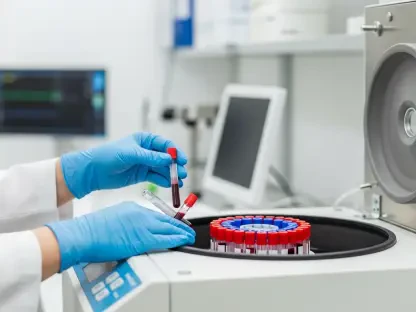Europe’s fight against bladder cancer is at a strategic crossroads with the emergence of new perioperative treatments that promise to redefine patient outcomes in unprecedented ways. Bladder cancer remains a formidable challenge for healthcare providers, emphasizing an acute need for advances in therapeutic options. The recent European Commission approval of Imfinzi has introduced a paradigm shift, highlighting immunotherapy’s potential to significantly alter the treatment landscape for muscle-invasive bladder cancer (MIBC). This development marks a substantial turning point, enabling medical professionals to address the limitations of existing treatment modalities more effectively.
Current State of Bladder Cancer Treatment in the EU
Bladder cancer treatment in the European Union is characterized by a multi-faceted landscape where healthcare providers continually adapt to emerging medical technologies and treatment protocols. The current state comprises surgery, chemotherapy, and radiotherapy as primary treatment methods, with radical cystectomy being the prevalent approach for MIBC. Despite these efforts, a significant number of patients experience recurrence, underscoring the demand for innovative solutions.
Key players in the industry, including leading pharmaceutical companies, work towards enhancing the efficacy and precision of treatments available in the market. The sector is subject to stringent regulations, ensuring adherence to safety and quality standards. Technological influences such as precision medicine and ongoing research and development activities are shaping future strategies and opening avenues for new therapeutic options.
Imfinzi and Emerging Trends in Bladder Cancer Care
Impact of Immunotherapy on Cancer Treatment
Imfinzi’s introduction signifies a burgeoning trend toward incorporating immunotherapy into standard cancer care practices. Immunotherapy has emerged as a transformative force, harnessing the body’s immune system against cancer cells. This shift reflects changing consumer behaviors and market drivers that emphasize scientifically grounded, patient-centric approaches to treatment. With Imfinzi, the opportunity to delay or prevent cancer recurrence post-surgery becomes more attainable, setting a promising direction for future innovations and breakthroughs.
Market Data and Projections for Imfinzi
The market for Imfinzi is experiencing robust growth, driven by rising demand for effective perioperative treatments and favorable trial outcomes. Projections indicate substantial market expansion in the coming years, as healthcare systems increasingly integrate Imfinzi within their treatment regimen for bladder cancer. Its success is underpinned by performance indicators demonstrating reduced disease progression and mortality, suggesting a solid foothold in oncology care and a promising trajectory for continued growth and market share acquisition.
Challenges and Complexities in Adopting Imfinzi
Despite its promising potential, adopting Imfinzi presents several challenges centered around technological, regulatory, and market-driven barriers. The integration of advanced therapies such as Imfinzi necessitates comprehensive infrastructure upgrades and skilled personnel capable of transitioning to enhanced treatment protocols. Moreover, aligning with the regulatory frameworks poses additional complexities, requiring meticulous compliance to approve and utilize new therapeutics effectively.
Potential solutions involve leveraging strategic partnerships between academic, clinical, and industry stakeholders to promote knowledge sharing and streamline approval processes. Additionally, understanding the nuances of local healthcare markets and investment in targeted educational initiatives further facilitate the adoption of such advanced treatments.
Regulatory Approval and Its Impact on Treatment Standards
Regulatory approval of Imfinzi marks a critical milestone in setting new benchmarks for treatment standards in the EU. Robust regulatory frameworks guide the introduction and application of innovative therapies, providing structured pathways for their safe implementation within health systems. The approval signifies compliance with stringent regulations, advocating for patient safety and treatment efficacy within the industry.
The implications of such regulatory endorsements extend beyond mere market access, influencing clinical practices by elevating the standards of care offered to patients. This regulatory nod serves to integrate high-impact therapies into mainstream healthcare, shaping future treatment protocols and enhancing outcomes for bladder cancer patients across Europe.
Future Directions in Bladder Cancer Treatment
The future of bladder cancer treatment is poised for transformative shifts fueled by emerging technologies and evolving market dynamics. Continued innovation, particularly in personalized medicine and targeted therapies, promises to redefine patient interaction and care delivery. Disruptors such as advancements in genomic studies and artificial intelligence offer paths toward more precise diagnostic and therapeutic solutions.
Prospective growth areas focus on a patient-oriented approach supported by cutting-edge research and development activities. As healthcare systems worldwide embrace these changes, the integration of global economic considerations will play a pivotal role in sustaining momentum and broadening access to state-of-the-art treatment options.
Conclusion and Recommendations
The exploration into Imfinzi’s potential to revolutionize bladder cancer treatment illustrates a pivotal moment in oncology care within the EU. The approval and utilization of Imfinzi reflect a positive shift towards integrating immunotherapies, redefining treatment standards and patient outcomes. Such advancements underscore the necessity for ongoing regulatory harmonization and technological adoption across the industry.
Looking forward, stakeholders are recommended to invest in research, augment educational initiatives, and foster collaborations that can streamline the transition from traditional therapies to innovative, personalized treatment regimens. These steps promise to enhance therapeutic efficacy, addressing current limitations while paving the way for improved healthcare delivery in bladder cancer management.









